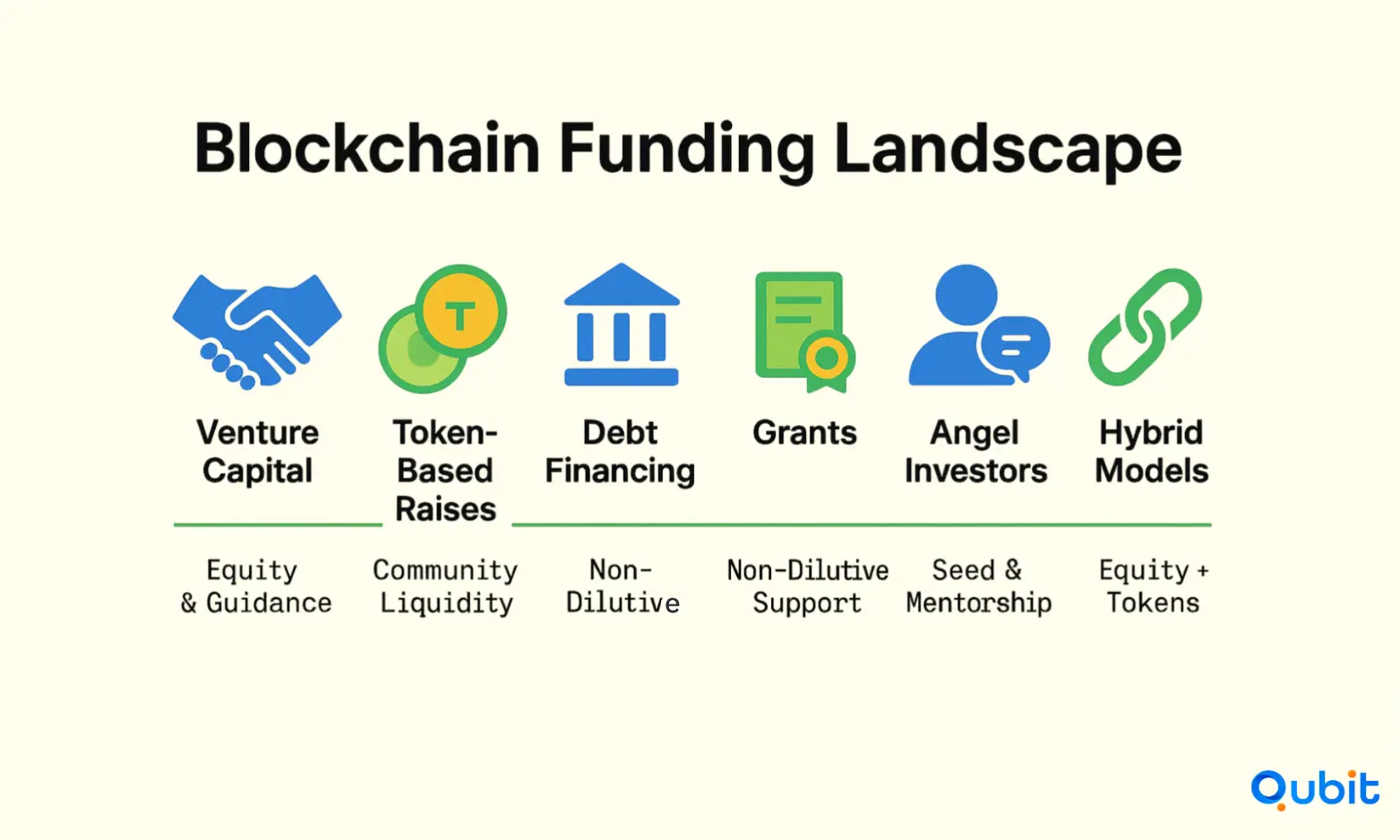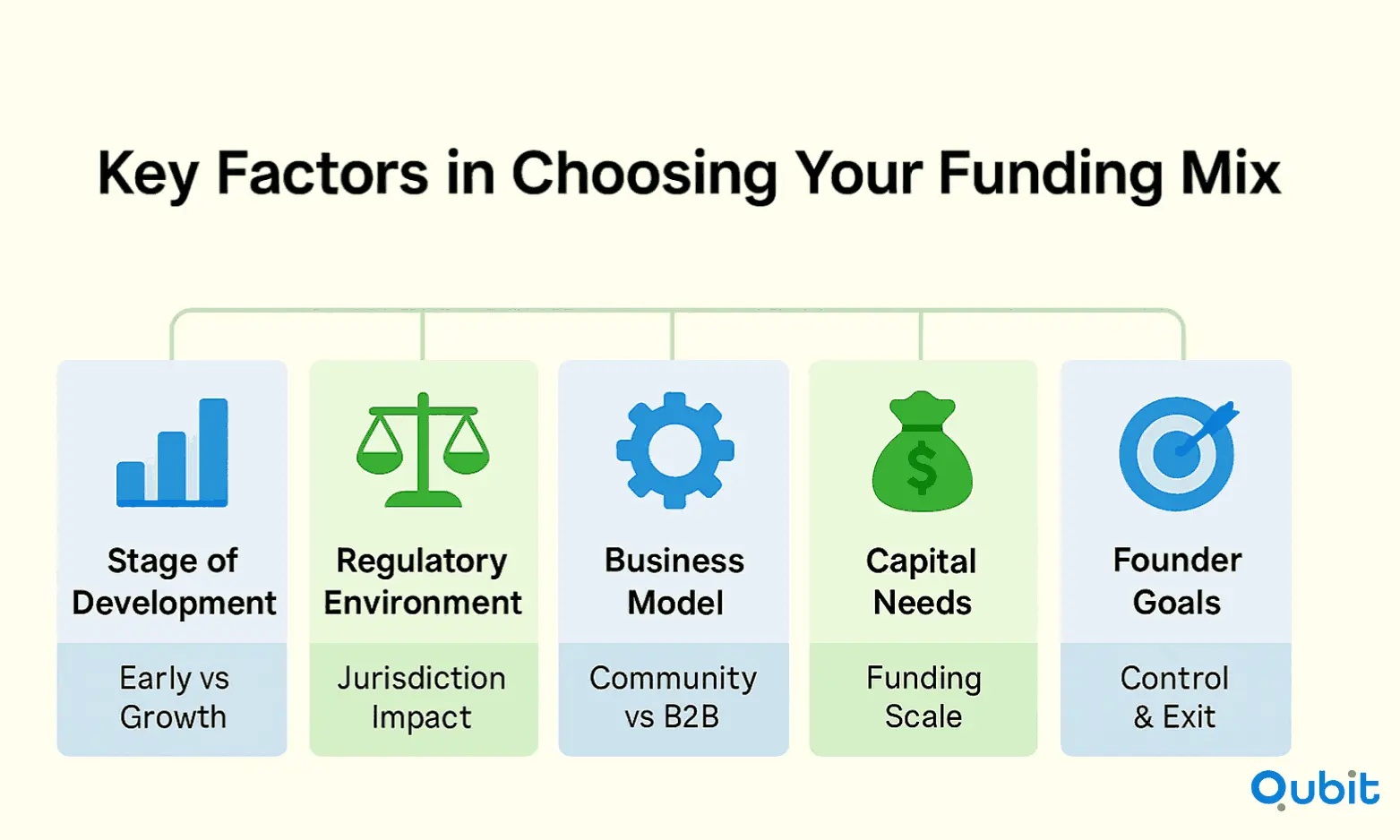Blockchain technology has revolutionized industries, but securing funding for blockchain start-ups remains a complex challenge. Entrepreneurs often face a maze of financing options, from traditional equity investments to innovative token-based models. Understanding these pathways is crucial for building a sustainable business. The discussion in blockchain startup fundraising strategies provides a panoramic view of market trends and challenges that positions your understanding of blockchain financing within a broader context.
This article explores actionable strategies and advanced trends to help founders make informed decisions about debt, equity, and token-based financing.
Whether you're launching your first blockchain venture or scaling an existing one, this guide offers insights to navigate the evolving funding landscape.
Understanding the Modern Blockchain Funding Landscape
The funding environment for blockchain startups has matured significantly. In 2025, venture capital remains a major force, with global blockchain VC funding reaching $35 billion and leading firms like a16z Crypto and Pantera Capital backing high-potential projects. However, the days of easy money from initial coin offerings (ICOs) are over. Investors now demand regulatory clarity, real-world use cases, and sustainable business models

Startups today have access to a diverse menu of funding sources:
- Venture Capital (VC): Substantial capital and strategic guidance, typically in exchange for equity. A curated list of active investors is presented in blockchain venture funds, offering you a concrete sense of how venture funds are engaging with the blockchain and Web3 market.
- Token-Based Raises (ICO/IDO): Generate liquidity and community engagement by selling tokens, often without traditional intermediaries. A deeper examination of token-based financing appears in blockchain launchpad IDO guide, clarifying how community-driven methods operate alongside traditional funding approaches.
- Debt Financing: Loans or credit lines, sometimes through decentralized finance (DeFi) platforms, offering non-dilutive capital.
- Grants: Non-dilutive funding from blockchain foundations, ecosystem programs, or government initiatives.
- Angel Investors: Seed capital and mentorship, ideal for early-stage ventures.
- Hybrid Models: Combining equity and token warrants to appeal to a broader investor base.
Each option comes with unique advantages, risks, and implications for control, compliance, and future fundraising.
Equity Financing: The Traditional Backbone
Equity financing remains the most familiar and widely used method, especially for startups aiming for long-term growth and institutional backing.
Key Advantages:
- Strategic Support: VCs and angels often provide not just capital, but also mentorship, industry connections, and operational expertise.
- Alignment of Interests: Equity holders are incentivized to support the company’s growth and long-term success.
- Regulatory Clarity: Equity deals are well-understood by regulators and investors, reducing legal uncertainty.
Considerations:
- Dilution: Issuing new shares reduces founders’ ownership and control.
- Governance: Investors may require board seats or veto rights, influencing major decisions.
- Exit Expectations: Equity investors typically seek liquidity through IPOs, acquisitions, or token generation events.
For blockchain startups, equity financing is often paired with traditional SAFE (Simple Agreement for Future Equity) or convertible note structures, sometimes augmented by token warrants to capture upside from future token launches.
Token-Based Financing: Community and Liquidity
Token-based fundraising, via ICOs, IDOs, or token sales, remains a powerful tool for blockchain startups. It enables rapid capital formation, fosters community engagement, and can provide liquidity for both the project and its backers.
Key Advantages:
- Global Access: Tokens can be sold to a worldwide audience, expanding the pool of potential supporters.
- Liquidity: Tokens can often be traded on secondary markets soon after launch, providing early liquidity for holders.
- Community Alignment: Token holders are incentivized to support network growth and adoption.
Considerations:
- Regulatory Uncertainty: Token sales are subject to evolving securities laws and compliance requirements, which vary by jurisdiction.
- Market Volatility: Token prices can be highly volatile, impacting both fundraising success and project reputation.
- Sustainability: Projects must design robust tokenomics to avoid inflation, misaligned incentives, or short-term speculation.
A well-structured token sale requires a compelling whitepaper, transparent tokenomics, and clear legal guidance. Increasingly, founders are using hybrid models, offering both equity and token warrants, to balance investor interests and reduce regulatory risk.
Debt Financing: Non-Dilutive Alternatives
Debt financing, including loans and credit lines, is gaining traction as a non-dilutive funding option. For blockchain startups, debt can be sourced from traditional banks, private lenders, or increasingly, from DeFi protocols.
Key Advantages:
- No Dilution: Founders retain full ownership and control.
- Predictable Repayment: Debt is repaid over time, typically with fixed interest, making costs more predictable.
- Flexible Use: Debt can be used for working capital, growth, or bridging to the next funding round.
Considerations:
- Repayment Obligations: Debt must be repaid regardless of business performance, increasing financial risk.
- Collateral Requirements: Lenders may require assets or token holdings as collateral, especially in DeFi lending.
- Limited Upside: Debt investors do not share in the company’s long-term growth or token appreciation.
DeFi lending platforms offer innovative options, such as collateralized loans against crypto assets, with lower barriers to entry and flexible terms. However, founders must carefully manage risks related to smart contract vulnerabilities, liquidation thresholds, and market volatility.
Hybrid Approaches: Combining Equity and Token-Based Financing
A growing trend among blockchain startups is the use of hybrid fundraising models—offering both equity and token-based instruments in a single round. This approach can attract a wider range of investors and help mitigate regulatory uncertainty.
How It Works:
- SAFE + Token Warrant: Investors receive a SAFE (or convertible note) for equity, plus a warrant granting the right to purchase tokens at a nominal price when they are issued.
- Conversion Options: Some structures allow investors to choose between converting their SAFE into equity or exercising their token warrant, but not both.
- Regulatory Clarity: The primary investment is in equity, a familiar asset class, while the token warrant provides exposure to future token upside.
Benefits:
- Investor Flexibility: Appeals to both traditional VCs and crypto-native investors.
- Risk Mitigation: Reduces regulatory risk by anchoring the deal in equity, with token participation as an optional upside.
- Alignment: Ensures that investors remain aligned with the company’s success, regardless of whether the project pursues a token launch or traditional exit.
Hybrid models require careful legal structuring and clear communication with investors to avoid misunderstandings and ensure compliance.
Grants and Non-Dilutive Funding
Non-dilutive funding from blockchain foundations, ecosystem programs, and government grants is an increasingly attractive option—especially for early-stage or open-source projects.
Advantages:
- No Equity or Token Dilution: Grants do not require giving up ownership or future token supply.
- Ecosystem Support: Many grant programs offer mentorship, technical resources, and community exposure.
- Validation: Securing a grant from a reputable foundation can boost credibility with investors and users.
Challenges:
- Competitive Application Process: Grants are limited and often highly competitive.
- Milestone-Based Disbursement: Funds may be released only upon achieving specific development milestones.
- Limited Scale: Grants are typically smaller than VC or token raises and may not be sufficient for rapid scaling.
Founders should monitor active grant programs, tailor applications to ecosystem priorities, and be prepared for a rigorous vetting process.
Key Factors in Choosing the Right Financing Mix

Selecting the optimal combination of debt, equity, and token-based financing depends on several factors:
- Stage of Development: Early-stage startups may rely more on grants, angel investment, or token pre-sales, while growth-stage companies often seek VC or hybrid rounds.
- Regulatory Environment: Projects operating in uncertain or restrictive jurisdictions may prefer equity or hybrid models to minimize legal risk.
- Business Model: Protocols with strong community or network effects may benefit from token-based fundraising, while B2B or infrastructure plays may lean toward equity.
- Capital Needs: Large-scale projects may require a mix of funding sources to meet ambitious growth targets.
- Founder Goals: Consider your long-term vision for ownership, control, and exit strategy.
Investor Psychology and Market Trends in 2025
Investors in 2025 are more discerning than ever. They scrutinize legitimacy, market traction, regulatory clarity, and sustainable ROI. Projects that address real-world problems, demonstrate user demand, and have transparent compliance frameworks attract the most interest.
- Legitimacy: Clear utility and regulatory compliance are essential for institutional investment. Projects like Worldcoin, with robust identity solutions, have drawn significant backing.
- Market Traction: Pre-launch partnerships, active user communities, and early revenue signals strong demand.
- Regulatory Clarity: Transparent compliance and risk mitigation indicate lower legal exposure, as seen with Circle’s USDC stablecoin.
- Sustainable ROI: Well-designed tokenomics and stable revenue channels reassure potential funders, as exemplified by dYdX’s revenue model.
Structuring Your Fundraise: Practical Considerations
- Legal Readiness: Proper incorporation, protected intellectual property, and clear founder agreements build investor confidence and help manage cross-jurisdictional challenges.
- Transparent Communication: Clearly explain the rights, risks, and upside of each financing instrument to potential investors.
- Regulatory Compliance: Engage experienced counsel to navigate securities laws, token classifications, and cross-border issues.
- Community Engagement: For token-based raises, active community management is crucial for building trust and sustaining momentum.
- Diversification: Don’t rely on a single funding source. Combining multiple approaches can mitigate risk and increase resilience.
Case Study: Combined Fundraising in Practice
A blockchain startup seeking to balance regulatory clarity with community engagement might structure its round as follows:
- Raise initial capital through a SAFE, offering equity to institutional investors.
- Issue token warrants alongside the SAFE, giving investors the right to purchase tokens at a nominal price upon a future token generation event.
- Clearly define conversion mechanics: if the token warrant is exercised, the right to convert SAFE to equity terminates, ensuring no double-dipping.
- Supplement with grants from relevant blockchain foundations to support early development without dilution.
This approach provides a safety net for investors (equity if no token event occurs) while enabling participation in token upside, all within a compliant legal framework.
The Role of DeFi and Alternative Funding
Decentralized finance platforms are opening new doors for startup funding. By leveraging liquidity pools and decentralized lending, founders can access capital without traditional intermediaries.
- Lower Barriers: DeFi loans typically have fewer requirements than banks.
- Flexible Terms: Startups can customize loan terms to suit their needs.
- Risks: Smart contract vulnerabilities and market volatility require careful management.
DeFi is best used as a supplement to traditional fundraising, providing working capital or bridging between major rounds.
Navigating Grant Programs and Ecosystem Support
With VC markets more cautious and deal flow slower in 2025, grants have become a lifeline for many startups. Programs from networks like Polygon, Ethereum, and Solana offer millions in non-dilutive funding for projects aligned with their ecosystems.
- Fast, Flexible Funding: Many grants offer rolling approvals and milestone-based disbursements.
- Ecosystem Access: Grantees gain entry to founder communities, marketing, and distribution support.
- Visibility: Grants can boost your project’s profile and credibility in the broader blockchain community.
Conclusion
For blockchain startups in 2025, balancing debt, equity, and token-based financing is both an art and a science. The optimal mix depends on your project’s stage, regulatory environment, business model, and long-term vision. By understanding the strengths and trade-offs of each option, and by staying attuned to evolving investor expectations, founders can maximize their chances of securing the capital needed to build, scale, and lead in the fast-moving world of blockchain innovation.
For startups seeking comprehensive funding solutions, we at Qubit Capital provide expert fundraising assistance to help navigate complex financing landscapes. Move forward with our blockchain fundraising assistance. Begin your readiness sprint now!
Key Takeaways
- Diverse funding models now supplement traditional equity and debt financing in the blockchain space.
- Regulatory compliance and transparency are key pillars for successful funding strategies.
- Innovative approaches such as DAOs, DeFi, and cross-chain fundraising are reshaping the industry.
- Practical steps in wallet management and investor engagement are critical for long-term success.
- A balanced, strategic approach can help blockchain startups secure the right capital while mitigating risks.
Frequently asked Questions
What are the best funding options for blockchain startups?
Blockchain startups can choose from a variety of funding methods tailored to their needs. These include Security Token Offerings (STOs), Initial Exchange Offerings (IEOs), Initial DEX Offerings (IDOs), venture capital investments, and decentralized models such as DAOs.






